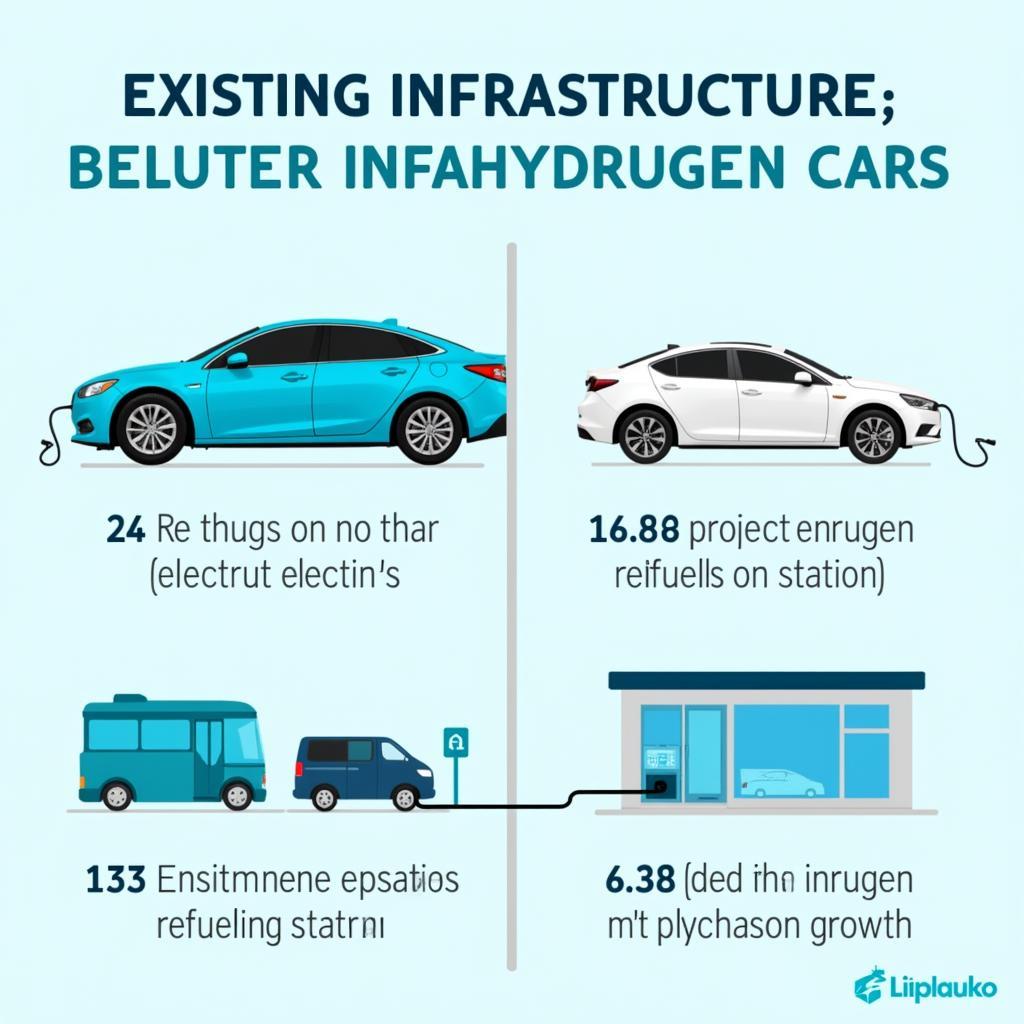Hydrogen cars and electric cars are both touted as eco-friendly alternatives to gasoline-powered vehicles, but they differ significantly in their underlying technologies and practical applications. This article delves into the key differences between hydrogen and electric cars, examining their respective advantages and disadvantages to help you understand which technology might dominate the future of green driving.
Fueling the Future: Hydrogen vs. Electricity
Both hydrogen and electric vehicles aim to reduce our reliance on fossil fuels, but their approaches diverge when it comes to energy storage and delivery. Electric cars store energy in batteries and are charged directly from the power grid, while hydrogen cars generate electricity onboard by reacting hydrogen gas with oxygen in a fuel cell. This fundamental difference leads to variations in performance, infrastructure requirements, and environmental impact.
Hydrogen Cars: The Pros and Cons
Hydrogen cars offer several potential advantages, including:
- Fast refueling: Filling a hydrogen tank takes just a few minutes, similar to gasoline cars.
- Long range: Hydrogen cars can travel long distances on a single tank, often exceeding the range of many electric vehicles.
- Zero tailpipe emissions: The only byproduct of the chemical reaction in a fuel cell is water vapor, making hydrogen cars truly emissions-free.
However, hydrogen technology also faces some significant challenges:
- Limited infrastructure: Hydrogen refueling stations are scarce, hindering widespread adoption.
- Hydrogen production: Producing green hydrogen, which is generated from renewable energy sources, is currently expensive and energy-intensive.
- Storage challenges: Storing hydrogen requires high-pressure tanks, which adds to the complexity and cost of the vehicles.
Electric Cars: The Pros and Cons
Electric cars have become increasingly popular in recent years, thanks to:
- Growing charging infrastructure: Public charging stations are becoming more common, making it easier to own and operate an electric vehicle.
- Lower running costs: Electricity is typically cheaper than gasoline, resulting in lower fuel costs for electric car owners.
- Home charging convenience: Many electric car owners can charge their vehicles at home overnight, eliminating the need to visit gas stations.
Despite their growing popularity, electric cars also have some drawbacks:
- Longer charging times: Charging an electric car can take significantly longer than filling a gas tank or a hydrogen tank.
- Range anxiety: The limited range of some electric cars can be a concern for long journeys.
- Battery production impact: The production of electric car batteries has environmental implications, including mining and manufacturing processes.
Which is the Greener Choice? A Closer Look at Environmental Impact
While both hydrogen and electric cars offer cleaner tailpipe emissions compared to gasoline cars, the overall environmental impact depends on the source of the energy used to power them. If hydrogen is produced using renewable energy sources, it can be a truly green fuel. However, most hydrogen is currently produced from natural gas, a fossil fuel, which negates some of the environmental benefits. Similarly, the environmental impact of electric cars depends on the electricity source used to charge them. If the electricity comes from renewable sources like solar or wind power, electric cars offer a significantly lower carbon footprint.
The Future of Mobility: Hydrogen or Electric?
Predicting the future of mobility is a complex task, but several factors suggest that electric cars currently have a significant advantage over hydrogen cars. The established charging infrastructure, lower running costs, and advancements in battery technology are driving the rapid growth of the electric car market. While hydrogen technology holds promise, it faces significant hurdles in terms of infrastructure development, production costs, and storage challenges.
 Cơ sở hạ tầng xe điện và xe hydrogen
Cơ sở hạ tầng xe điện và xe hydrogen
Hydrogen vs Electric Cars: What’s Right for You?
The best choice between a hydrogen car and an electric car depends on your individual needs and circumstances. If you prioritize fast refueling and long range, and a hydrogen refueling station is conveniently located, a hydrogen car might be a suitable option. However, for most drivers, electric cars currently offer a more practical and accessible solution due to the growing charging infrastructure and lower running costs.
Conclusion: Driving Towards a Sustainable Future
Both hydrogen and electric cars represent significant steps towards a more sustainable transportation future. While hydrogen technology offers potential advantages in terms of range and refueling speed, electric cars currently hold a stronger position due to their established infrastructure and lower running costs. Ultimately, the future of green driving may involve a combination of both technologies, each catering to different needs and applications. The transition to cleaner transportation is underway, and both hydrogen and electric vehicles will play a crucial role in shaping the future of mobility.
FAQs
- Are hydrogen cars safer than electric cars? Both types of vehicles undergo rigorous safety testing.
- How much does a hydrogen car cost? Hydrogen cars are generally more expensive than comparable electric cars.
- What is the range of a hydrogen car? Hydrogen cars can typically travel over 300 miles on a single tank.
- How long does it take to charge an electric car? Charging times vary depending on the charger and battery size, but it can take several hours to fully charge an electric car.
- Where can I find hydrogen refueling stations? Hydrogen refueling stations are still limited in number and primarily located in specific regions.
- Are electric cars better for the environment than gasoline cars? Yes, electric cars produce zero tailpipe emissions and have a lower overall carbon footprint than gasoline cars, especially when charged with renewable energy.
- What are the different types of electric car batteries? Common battery types include lithium-ion, nickel-metal hydride, and lead-acid.
Have other questions? We’re here to help!
For further assistance, please contact us at Phone: 0372999888, Email: [email protected] or visit us at 236 Cau Giay, Hanoi. Our customer service team is available 24/7. You can also check out our other articles on [link to other relevant articles on your website].